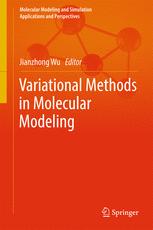

Most ebook files are in PDF format, so you can easily read them using various software such as Foxit Reader or directly on the Google Chrome browser.
Some ebook files are released by publishers in other formats such as .awz, .mobi, .epub, .fb2, etc. You may need to install specific software to read these formats on mobile/PC, such as Calibre.
Please read the tutorial at this link: https://ebookbell.com/faq
We offer FREE conversion to the popular formats you request; however, this may take some time. Therefore, right after payment, please email us, and we will try to provide the service as quickly as possible.
For some exceptional file formats or broken links (if any), please refrain from opening any disputes. Instead, email us first, and we will try to assist within a maximum of 6 hours.
EbookBell Team

4.8
24 reviewsThis book presents tutorial overviews for many applications of variational methods to molecular modeling. Topics discussed include the Gibbs-Bogoliubov-Feynman variational principle, square-gradient models, classical density functional theories, self-consistent-field theories, phase-field methods, Ginzburg-Landau and Helfrich-type phenomenological models, dynamical density functional theory, and variational Monte Carlo methods. Illustrative examples are given to facilitate understanding of the basic concepts and quantitative prediction of the properties and rich behavior of diverse many-body systems ranging from inhomogeneous fluids, electrolytes and ionic liquids in micropores, colloidal dispersions, liquid crystals, polymer blends, lipid membranes, microemulsions, magnetic materials and high-temperature superconductors.
All chapters are written by leading experts in the field and illustrated with tutorial examples for their practical applications to specific subjects. With emphasis placed on physical understanding rather than on rigorous mathematical derivations, the content is accessible to graduate students and researchers in the broad areas of materials science and engineering, chemistry, chemical and biomolecular engineering, applied mathematics, condensed-matter physics, without specific training in theoretical physics or calculus of variations.